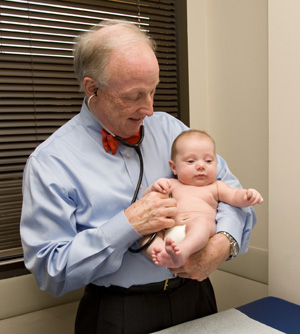What to Expect as Your Child Grows:
The Two to Five Day Visit
How Are You Feeling?/The Postpartum Blues
 More than fifty percent of women experience postpartum blues on the third or fourth day after delivery.
More than fifty percent of women experience postpartum blues on the third or fourth day after delivery.- Symptoms include tearfulness, tiredness, sadness, and difficulty in thinking clearly.
- Many mothers feel let down and guilty about these symptoms, as they feel they should be overjoyed about caring for their newborn.
- Symptoms usually clear up in one to three weeks.
- Do not be afraid to discuss your feelings, get as much rest as possible, and ask for help with all your work.
- The best way to take good care of your baby is to take good care of yourself! If you don't feel better by the time your baby is one month of age or if the blues are making it hard to care for you and your baby, get help as soon as possible.
Feeding
- All babies lose a few ounces in the first days of life (up to ten percent of their birth-weight).
- Your baby should have breastmilk or formula ONLY until he/she is at least 4-6 months of age. Breastfed infants will usually nurse 15-20 minutes per breast and this will occur every 2 to 3 hours. Formula fed infants will start by taking about 2-4 ounces every 3 hours in the first few weeks; use more if he is still hungry.
- Although you may be anxious to get your baby’s feedings on a schedule, during the first weeks of life, you should feed your baby on demand. Again, this usually occurs about every 3 hours but it may occur more frequently during growth spurts. Remember, every baby is different!
- Feed only when your baby shows signs of hunger, such as when he puts his hands to his mouth, when he sucks or roots, or when he is fussing.
- If breastfeeding, feed eight to twelve times per day.
Diaper Duty
- Stool in the first few days of life is black and tarry. This is called “meconium.” As your baby takes in more breastmilk or formula, his/her stools will look different. Breastfed babies’ stools are soft, yellow and seedy. They usually stool after every feed. Formula fed babies usually have stools that are more pasty and brown.
- All babies have a lot of gas. This is a normal product of digestion. Do not be concerned.
- Babies often strain, grimace and turn red while stooling. This is normal and it does not mean it is painful for your child to stool.
Sleep
- Newborn babies sleep on average 14-18 hours per day. In the beginning, many newborns may have “day/night reversal” meaning that they sleep more during the day than at night. As a parent, what should you do?
- Wake your baby if he/she has been sleeping longer than 3 hours during the day
- Stimulate him/her during the day and keep stimulation at a minimum during the night
- Remember it takes several months before your newborn will be “sleeping through the night.”
Baby Care
- Call us if your baby has a temperature of 100.4° Fahrenheit (38° Celsius). A fever before 2 months of age is an emergency. If your baby feels warm, you should take his/her temperature rectally. If your child has a temperature greater than 100.4° Fahrenheit, a physician should evaluate him/her immediately. Call our office or the after hours line right away.
- Your newborn’s umbilical stump usually falls off around 2 weeks of age. Washing the area with soap and water is the only care necessary. If your child develops any redness or pus around the area, please contact us immediately.
- Babies get many rashes in the first four to eight weeks. Call if you are concerned.
- Lots of hiccups, lots of sneezes in the newborn period – this is very normal. Your baby’s nasal passageways are very small. This should improve as he/she gets older.
- Wash your hands often and have everyone who touches the baby do so as well.
- Avoid crowds.
Safety
- Your baby should sleep on his/her back only. The “back to sleep” campaign started in 1992 and has been the greatest intervention in decreasing the incidence of “Sudden Infant Death Syndrome” (SIDS). Discuss with your physician other ways to prevent SIDS.
- Your baby’s crib should have no soft bedding, no toys, no crib bumpers. Use a crib with slats 2 3/8 inches apart. Your baby should not sleep in your bed.
- The infant car safety seat should be rear-facing in the middle of the back in all vehicles.
- Your baby should never be in a seat with a passenger side air bag.
- Keep your car and home smoke free.
- Make sure your hot water heater is set lower than 120° Fahrenheit.
- Test your baby’s bath water with your wrist.
- Take a first aid/infant CPR class.
What to Expect at This Visit
 We will check your baby’s weight. Your baby may lose weight initially, which is normal. However, he/she should not lose more than 10% of his/her birth weight. We expect that your baby should be back at his/her birth weight by 2 weeks of age.
We will check your baby’s weight. Your baby may lose weight initially, which is normal. However, he/she should not lose more than 10% of his/her birth weight. We expect that your baby should be back at his/her birth weight by 2 weeks of age.- We routinely check the bilirubin level at this visit because this is usually when a baby’s bilirubin level is highest. We use a non-invasive skin test to check the bilirubin level. If the bilirubin is high, we will follow up with a blood test.
- Everyone’s blood contains bilirubin, which is removed by the liver. Most babies develop jaundice in the first few days after birth because it takes a few days for the baby’s liver to get better at removing bilirubin. Most babies have mild jaundice that is harmless, but in unusual situations the bilirubin level can get very high and might cause brain damage. This is why newborns should be checked carefully for jaundice and treated to prevent a high bilirubin level.
- If you are breastfeeding, we will schedule time for you to meet with our Lactation Consultant.
- After your 2 week visit, you will see us again at 2 months of age for your baby’s first round of vaccinations.


